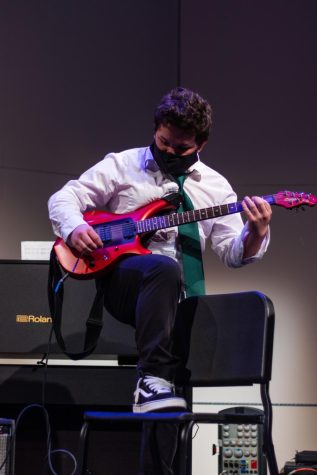Guest Column: How ALS Hero Jason Becker Inspires Me
There have been many people to pick up the guitar, but none have the resilience and drive of Jason Becker.
Born in 1969, Becker picked up the guitar for the first time at age five. Both his father and uncle were guitar players, so they helped Becker on his journey to becoming the best player he can be. His dedication set five-year-old Jason apart. Sure, most kids who pick up the guitar at such a young age dream about someday becoming a guitar legend, but most rarely find the dedication needed to make these dreams a reality. Jason, however, was practicing over ten hours a day and was playing gigs as early as sixth grade.
Jason’s big break came when word of his playing reached guitar legend, Marty Friedman. Marty got in touch with Jason and the two formed a guitar duo named Cacophony. Their debut album, “Speed Metal Symphony,” was released within a year and the album is still praised as being one of the best albums of guitar work out there.
Becker had managed to do what most guitarists take a lifetime to accomplish. He was on the very top of the guitar world and released some of the greatest pieces of guitar work to ever exist. His solo album “Perpetual Burn” made the billboard chart 100, which very few virtuosic guitar players managed to accomplish.
Fans and critics raved about how such a young man could have so much technical ability and talent. On the cover of magazines, getting to play in front of massive amounts of people, and being praised as the best player of his generation. He had so much ahead of him, but tragedy would strike.
During recording for David Lee Roth’s upcoming album “A Little Ain’t Enough,” Becker noticed a limp in his leg, but thought nothing of it until he started feeling numbness in his arms and legs. After a while, Becker would go to get it checked out, and was diagnosed with amyotrophic lateral sclerosis (ALS) or otherwise known as Lou Gehrig’s Disease. This would paralyze Jason from the neck down, and he would be unable to talk, move, and most importantly to him, play guitar. Jason was given three years to live. Doctors were so worried about his case, that they told him that there was no point in changing his diet because his situation was hopeless.
For the next couple of months, Jason would do his best to finish recording Roth’s album, but his hands became so fragile that he would continue to have to lower the weight of the strings in order to keep playing. He finished the recordings but was unable to tour with the band due to his disease. Roth wrote in his autobiography that he felt like the lucky one to work with Becker.
“Trying to hire a genius is like designing art by a committee. Damn near impossible. But I came so close you could feel the heat coming off it, with a fellow named Jason Becker,” Roth wrote.
After he completely lost the use of his hands, Jason kept composing with the help of a special computer that responded to his head movements. The computer’s mouse would move in response to Jason turning his head and would click when he opened his mouth. And using this computer, Jason spent five painstaking years composing music for his second solo album Perspective.
Jason never gave up. Now in his 50s, Jason’s condition has been stable since 1997. A remarkable thing considering the fact that he wasn’t given more than three years to live by doctors that diagnosed him. To record music now, Jason uses a device that tracks his eye movements, which allows him to input certain notes and patterns to write music. He also uses a similar device to be able to communicate with others, as seen in his interviews of recent years.
The following Q&A was originally published in The Quietus on November 12, 2012.
What are the biggest challenges, mental or physical, that ALS places on you?
Physical: losing all movement makes things challenging; luckily, I am set up now, but things constantly need changing, adjusting, rearranging, and that can get somewhat tiresome. It’s difficult to get out much so I miss a lot of things. My eyes get tired at times, and that makes it hard to communicate since I spell with my eyes. I really miss being able to hug my girlfriends, friends, and family, pet, and play with my animals. I miss being able to crack a quick joke at the perfect time, run around, play basketball, football, drive, eat, and most of all, play guitar and compose music by myself if I want. I miss really being alone and having privacy.
Mental, well I have dark moments. I sometimes wonder what it’s all about and why I work so hard for something I want that often doesn’t come to be. I worry about hardships, money, being in a completely vulnerable position, etc.
Many sufferers of long-term medical conditions develop incredible mental fortitude. Has ALS made you a stronger person?
I suppose so, but I really don’t know. I don’t feel strong necessarily. I just live my life. I know that things didn’t turn out the way I had planned, but after the initial shock of it all, what can you do? When I think about it, I seem strong, but I still make music and I have lots of love and fun and the people around me seem strong too, so it makes me feel humble and grateful. I understand the feeling of hopelessness and loss, but I also understand the feeling of love and gratitude. It all depends on what mood you catch me in. I think passion, purpose, and love are things that we all need. Those things make us all stronger.
Jason Becker’s story is one of brilliance, talent, determination, and triumph. Despite all the odds, he was able to push through and live his best life. Jason is currently the oldest person to have ALS, and also the longest life anyone with ALS has ever lived.
























































